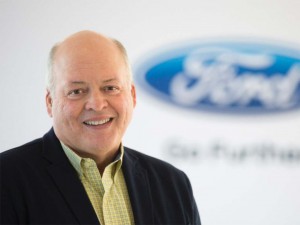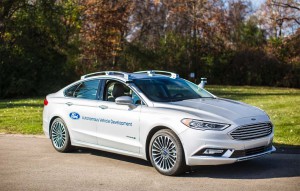
Prior to joining Ford, Jim Hackett was Steelcase CEO and served as Interim U-Michigan Athletic Director.
While Ford has won praise for its push into autonomous vehicles, car-sharing and other futuristic mobility programs, it has also been criticized for a lack of new products today, something CEO Jim Hackett said the Detroit carmaker is addressing.
In an interview with the Associated Press, the former Steelcase chief executive – who took over at Ford following a management shake-up in May – say there is plenty “in the hopper,” though he declined to offer details on what new products are coming. Ford has revealed plans to revive its Bronco SUV and Ranger pickup nameplates, but critics say the carmaker also needs to revitalize its mainstream passenger car and luxury line-ups.
Separately, Ford confirmed Thursday that it will pay up to $10.1 million to settle sexual and racial harassment allegations linked to its two Chicago-area factories. It also will add new training programs for workers at those plants.
(Trump disbands economic council. Click Here to see how it might affect the auto industry.)
CEO Hackett is in the midst of a self-proclaimed 100-day review of Ford’s strategies and plans launched after the ouster of his predecessor, Mark Fields, three months ago. Fields had been an active proponent of mobility programs and connected and autonomous vehicle efforts, but he was also faulted by some for downplaying the need for new products today.
In particular, Ford has been letting a number of mainstream passenger car models grow old, one reason it has seen demand dip faster than the overall U.S. market. Its sales were off 4% in July, with its market share falling 0.3 percentage points. Fields, among other things decided to move small car production – models such as the Focus and C-Max – out of the U.S., originally intending to build a new plant in Mexico but now shifting production to China. He also reined in efforts to expand the Lincoln brand line-up, though the long-struggling brand has been gaining momentum with its entry into the Chinese market.

Former CEO Fields was a high-tech proponent, shown here with a new LIDAR "pick" at the 2016 Consumer Electronics Show.
Dealers and investors have been calling on Ford to put more of a focus on its immediate needs, and Hackett told the AP, “We think dealers are really going to be happy with the vehicles we’ve got coming this year and what we’ve got in the hopper.” Exactly what those new products are remains unclear beyond the revival of the Bronco and Ranger models.
(Ford ousts Fields, shakes up entire management team. Click Here for more.)
Fields did commit to adding a range of new battery-based products, though it is lagging behind some key competitors, including both Tesla and General Motors. Those two companies now have long-range, mainstream-priced EVs on the market, the Tesla Model 3 and the Chevrolet Bolt EV. Ford’s comparable offering is more than a year from production.
Ford is also going to have to wait another year to introduce its first entry into the fast-growing U.S. market for subcompact SUVs, the EcoSport model it plans to import from China.
As for Ford’s push into autonomous and connected cars, as well as mobility alternatives, those familiar with the executive have told TheDetroitBureau.com they don’t expect to see major changes. They note that when he joined Ford’s Board of Directors, Hackett was put in charge of overseeing many of those ventures.
That said, he seems to be less convinced than Fields that the automotive world will see dramatics shifts in terms of car buying. The former CEO had openly expressed his belief that a sizable share of motorists would, in the coming decades, skip buying vehicles, relying instead on car- and ride-sharing services like Car2Go, Uber and Lyft.
“I’m not ready to admit that Ford is facing a world where it’s losing a lot of personal buyers,” Hackett said in his AP interview. “But I would admit that they’re going to have a lot more options.”
Ford has made a number of moves to expand its tech presence, including a recent alliance with both Amazon and Starbucks. That will allow motorists with Sync3-equipped vehicles to call up Amazon’s Alexa voice assistant and, among other things, order a cup of coffee to go. The suburban Detroit automaker has also purchased a San Francisco-based shuttle service, Chariot, and spent $1 billion for autonomous vehicle tech start-up Argo AI.
Nonetheless, personal vehicle ownership will remain a popular choice, said Hackett, who served as interim director of the University of Michigans athletics program before joining Ford.
As for the $10.1 million settlement worked out with U.S. Equal Employment Opportunity Commission, it covers both the Chicago Stamping Plant and Chicago Assembly Plant where the EEOC said it found evidence that both female and black workers had been subject to harassment.
Ford said it conducted its own investigation and ““took appropriate action, including disciplinary action up to and including dismissal.”
(Ford offers buyouts to 15,000 salaried workers. Click Here for the story.)


Hard to believe that Ford has a Product “Planning” organization.